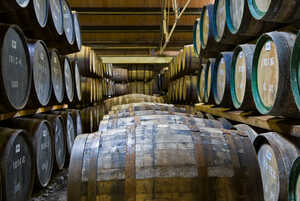Whisky investment: beware of the risks

Alternative investments such as fine wine and cask whisky are on the rise. But investors need to be aware of the potential risks associated with such opportunities — which can sometimes turn out to be a scam.
In 2023 there were 89 reports made to Action Fraud about alcohol investments, with losses totalling over £3m.
Interest in micro-breweries and independent distilleries has grown “exponentially” over the last decade as British consumers have become more interested in home-grown spirits versus imported beers and wine, said Detective Inspector Nichola Meghji from the Fraud Operations team at the City of London Police.
“Certain companies prey on people's lack of knowledge around investing, which is then exploited at a great cost to the consumer,” DI Meghji warned.
Misleading claims
The basic idea behind investing in whisky casks is that the cask is held in storage — sometimes for decades — until it matures into something that will have much greater value when it is ready to be bottled.
Ads for schemes to buy casks of Scottish whisky often appear on social media, but many of these ads make misleading claims about the potential returns, and fail to set out the risks involved.
An investigation by the the Advertising Standards Authority found adverts that were not easy to understand and “took advantage of consumers’ lack of experience and credulity”. It was not always made clear that fees would be incurred, meaning that investors could face unexpected charges later on. And some ads claimed that whisky cask investment was a suitable means to fund early retirement.
No FCA regulation
HM Revenue and Customs requires whisky brokerages to hold a Warehousekeepers and Owners of Warehoused Goods Regulations (WOWGR) licence.
“HMRC undertakes extensive checks prior to issuing revenue traders with these licences, which include director and shareholder background checks, business plans, letters of intent from suppliers and potential customers,” Oliver Court from whisky investment company London Cask Traders told the Guardian.
“We always urge clients to only deal with whisky brokerages which hold the valid WOWGR certification.”
Court added that potential investors should compare prices with a range of brokerages and invest in prominent distilleries.
Nevertheless, as the buying and selling of whisky casks is unregulated in the UK, consumers do not have the same financial protections as they would with a regulated financial product.
The City of London Corporation’s Port Health and Environmental Services Committee oversees the Square Mile’s Trading Standards operations. Its Chair, Mary Durcan, said:
“City Corporation Trading Standards team has serious concerns over the whisky investment schemes that have sprung up over the last couple of years.
“Casks are being sold as a long-term investment because whisky takes time to mature in the cask, consumers are being told. This means that it could be several years before investors realise their investments aren’t performing.
“It is vitally important to remember that whisky investments are not regulated by the Financial Conduct Authority (FCA) which means that there is no recourse to the Financial Services Compensation Scheme if anything goes wrong.”
Steer clear of investment fraud
To prevent becoming a victim of investment fraud, City of London Police recommends:
- Take your time considering investment opportunities — don’t be rushed into making an investment. Remember, legitimate organisations will never pressure you into investing on the spot.
- Seek advice first. Before making significant financial decisions, speak with trusted friends or family members, or seek professional independent advice.
- Use the FCA’s register to check if the company is regulated. If you deal with a firm (or individual) that isn’t regulated, you may not be covered by the Financial Ombudsman Service (FOS) if things go wrong and you lose your money.
Lastly, if you aren’t an expert in a certain field of investment, or feel that you don’t know enough about it, it’s probably best not to invest. Does it sound too good to be true? Then it probably is.
Posted by Fidelius on January 2nd 2024

